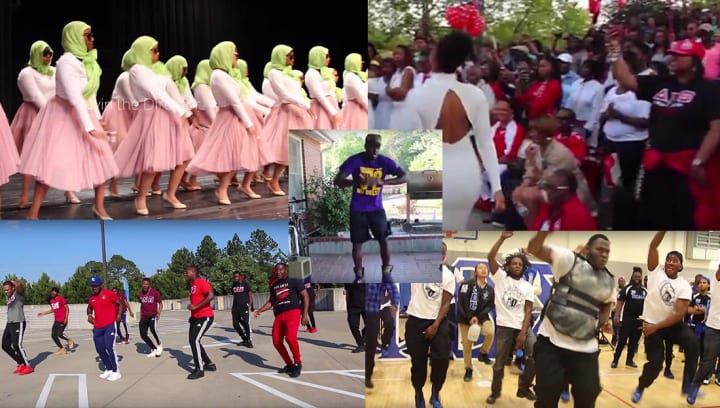3 Unconventional Ways to Network in College
"The opposite of networking is not working." - Someone Smart

Many of us go to college with the dreams of getting an education in order to make our dreams come true. We do this with the hopes of landing a job immediately after we graduate. However, according to rumors from friends of mine who have graduated, that’s not the case. But, I beg to differ; I believe that if you were active in college and social—or at least friendly to everybody—then you should at least have some form of a job lined up after college. One of the things that perplexed me about one of my friends was her completely asinine idea that college was supposed to both train you for your job and provide a job for you after you graduate—amazing, right? Unfortunately, I have been in college for six years—pursuing one degree, two minors, three certificates—and I have learned a thing or two. One of the things that I have learned is the power of relationship building or networking. I believe that the whole purpose of college, in addition to providing you a quality education, is to also allow you to network with other like-minded individuals—and those who aren’t so like-minded. Networking gives the power to get a leg up in the world because in these times, it isn’t about what you know or who you know, but, who knows you.
To me, there are two types of networking: horizontal networking and vertical networking. Horizontal networking is peer networking; or, in other words, socializing with people who are in the same position as you (i.e. pursuing a degree but not yet established). This typically happens at places like parties, kickbacks, cookouts, or campus events. Whereas, vertical networking is networking with more established individuals such as those who can actually get you that dream internship or job because they are in their career. This typically occurs at professional mixers and job fairs. In college, I believe you should follow the notorious 80/20 rule of networking; meaning 80 percent of your time should be dedicated to horizontal networking, while the other 20 percent should be dedicated to vertical networking. That said, the unconventional list will offer ideas that are a mixture of both. Now, without further ado, I present to you unorthodox ways of networking.
Go to parties.

I give this advice to freshmen all the time, yet they look at me like I have just blurted some racist, blasphemous, misogynistic slur at them. But, in reality, it's sound advice. The thing about going to parties is that it allows for you to socialize with people who could potentially be the world’s next top doctor or next Elon Musk or next president—you never know.
As a person who has thrown some amazing house parties during his time in college, I can honestly say that it would be amazing to able to meet back up, later on in life, with one of the people that I had met during one of my house parties. However, now, they are the one who is interviewing me for a job. The interview would basically be us reminiscing on good times in our college days. I would be like, “Yeah man…you remember that time you got so wasted that you left my house, and I found you later that night on the side of the road talking to the grass and I brought you back to my house to go to sleep. Only to find you the next morning sleeping in your own puke puddle on my couch?”
And he would be like, “Yeah, good times. So, you need a job?” Boom, just like that, I get a job—power of the network.
But on a serious note, go to parties and be social, you never know who will be beneficial to your future, or how you may be beneficial to theirs. Disclaimer: I am still in college, but I have gotten plenty of job offers in Atlanta just because I threw parties and went to parties throughout college (building my network). So now, when I graduate, I have plenty job of options—not trying to brag.
Go to department events on campus.

Yes. Kanye. Really bruh, it's a choice. Universities consists of colleges that contain different departments in them. For example, at my college, Columbus State University, we have a College of Letters and Science, the College of Health Professions, and so on. Within these colleges are the departments that house your major. I recommend that as a college student it is wise to support your department and build a relationship with all the professors in your department. One way of doing this is by actually showing up to the events that your department host and socializing with your teachers—you will see that they are people as well. Students already don’t show up to department events as is, so by you doing so you build a connection with the teachers of your department. Also, stopping by the office once in a while to check up on them isn’t such a bad idea as well. I attend department events as much as I can and I check up on the teachers as much as I can, and it has helped me astronomically. I mean to the point where I am getting job offers in South Korea, Mexico, and Taiwan. Once again, not trying to brag, just trying to share some testimonials with you.
Join a fraternity or sorority.

picture by: AlvintheDirector
I don’t think this last one is as unconventional as I made it out to be, nevertheless it is a good way to reap the benefits of the power of the network. Due to globalization, the world is becoming smaller, however, Greek life makes the world even smaller. Don’t believe me, then check out some of these statistics for yourself quoted by Fraternity Advisor:
- There are over nine million Greek members nationally
- Of the nation’s 50 largest corporations, 43 are headed by fraternity men.
- 85% of the Fortune 500 executives belong to a fraternity.
- 40 of 47 U.S. Supreme Court Justices, since 1910, were fraternity men.
- 76% of all Congressmen and Senators belong to a fraternity.
- Every U.S. President and Vice President, except two in each office, born since the first social fraternity was founded in 1825 have been members of a fraternity.
- 63% of the U.S. President’s Cabinet members since 1900 have been Greek.
- 71% of those listed in “Who’s Who in America” belong to a fraternity
Boom! Just by joining a fraternity and sorority, you associate yourself with influential, powerful, and professional individuals. Even more, they don’t have to be in positions such as Fortune 500 executives: they could be the founder of a startup nonprofit; they could be over the internship department of the local business that you want to intern for; or, they could be a district manager of Waffle House, who gets can get you the hookup on a free all-star meal when your funds are low. Whatever they do, it pays to be Greek. Why? Because the power of the network. I’m not going to share how I have benefited from the Greek Life, but know that it has been amazing.
So there you have it, three unconventional ways of networking. I hope you take them into consideration and use them; they really are beneficial. I personally believe that as people we have survived for millions of years because of our power of network and group cohesion. No one person is a nation by themselves, we need each other, so use the power of the network.
About the Creator
Jermaine Tucker
I am just your everyday college student pursuing a degree in Professional Writing, while trying to keep his head above water. The biggest room in the world is the room for improvement. I really like this quote :)






Comments
There are no comments for this story
Be the first to respond and start the conversation.